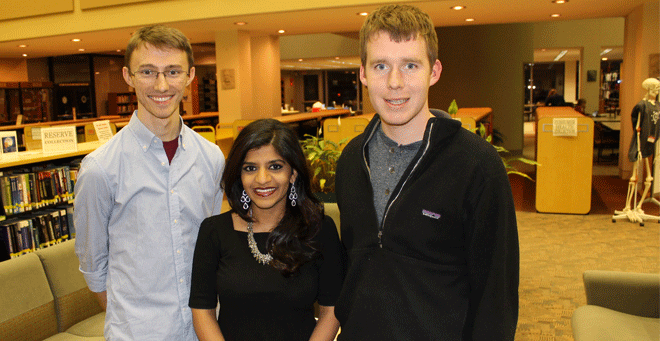 |
|
|
Alec Gramann, Vijaya Daniel and Jacob Hunnicutt are members of the inaugural class of the clinical and translational science training program. (Not pictured are Apurv Soni and Jonathan Green.) |
UMass Medical School has received a grant to develop a training program for the next generation of scientists. The four-year, $1.5 million grant from the National Center for Advancing Translational Sciences will fund a clinical and translational science program for predoctoral and early postdoctoral fellows across the entire translational spectrum.
In 2006, the National Institutes of Health launched the Clinical and Translational Science Award program, an initiative to accelerate the translation of basic science research from the lab to the clinic and beyond; the CTSA has since funded 62 clinical and translational science centers across the country. In 2010, UMass received NIH funding to join the group through the formation of the UMass Center for Clinical and Translational Science. This NIH funding, along with institutional support, provides services, cores and training programs that facilitate translation of scientific discoveries to the clinic.
“We are thrilled to add this new program to the UMCCTS. Our goal is to change the way that we translate science to the clinic by creating novel programs for training young scientists, and through direct support of young scientists’ research at these critical stages in their careers,” said Katherine Luzuriaga, MD, the UMass Memorial Health Care Chair of Biomedical Research, professor of molecular medicine, pediatrics and medicine, vice provost for clinical and translational science and global health, and director of the UMCCTS.
“The program will be founded on the idea that biomedical problems exist within a continuum that extends from molecular mechanisms to human populations and broader communities,” said Kate Lapane, PhD, co-principal investigator on the grant. Silvia Corvera, MD, the Endowed Chair in Diabetes Research and professor of molecular medicine and cell & developmental biology, partnered with Dr. Lapane to develop the program and serves as the other co-principal investigator on the grant.
“We recognize that to accelerate discovery and improve health, clinical and population scientists must understand and interact with the basic biomedical sciences,” said Lapane, professor of quantitative health science, associate dean for clinical and population health research and director of the CPHR training program in the Graduate School of Biomedical Science. Dr. Corvera added, “This program adds to the expanding portfolio of UMMS NIH-funded training programs, including the Medical Scientist Training Program (MD/PhD) and the Initiative for Maximizing Student Development.”
The goal for the new program is to attract highly qualified pre- and postdoctoral candidates from national and local pools and build a diverse trainee population. “A unique and really exciting part of this program is the transdisciplinary training model, where methods and approaches are defined by the questions being asked and the problems being solved, rather than by specific disciplines,” said Corvera.
“One of the tenets of our approach—transdisciplinary science—is that it flips science on its side and removes silos. By asking ‘What’s the big problem we’re working on?’ we bring scientists together from different disciplines,” said Lapane.
Lapane added that the way to change how people solve problems is by bringing together people from across the “T spectrum,” referring to the various phases of translational science: T0 (basic research); T1 (pre-clinical research); T2 (clinical research); T3 (clinical implementation); and T4-5 (public health).
The new program will leverage the existing collaborative relationships between UMMS departments, centers and institutes to provide trainees with strong mentoring teams, rigorous academic training tailored to individual research interests and the technical skills necessary for their success as independent investigators and contributors to team science. Postdoctoral trainees will complete the master’s in clinical investigation, while predoctoral trainees will complete the clinical and translational science concentration.
“Ultimately, the goal of the training program is to make a major contribution to a new national workforce of clinical and translational science researchers,” said Lapane, adding that five years from now there could be a “new generation” of grant applications that are truly representative of translational science.
Current trainees
|
Alec Gramann
|
Jonathan Green, MD
|
Jacob Hunnicutt
|
Apurv Soni
|
Vijaya Daniel, MD
|
Related links on UMassMedNow
Grant affirms UMMS MD/PhD program ‘among the best’
NIH Initiative for Maximizing Student Development funds UMMS program